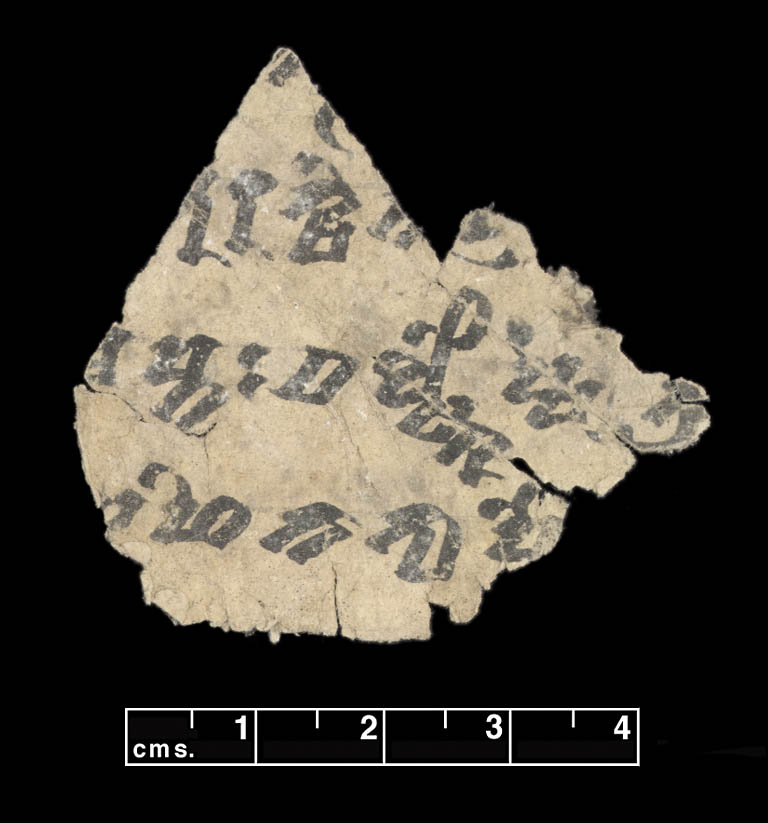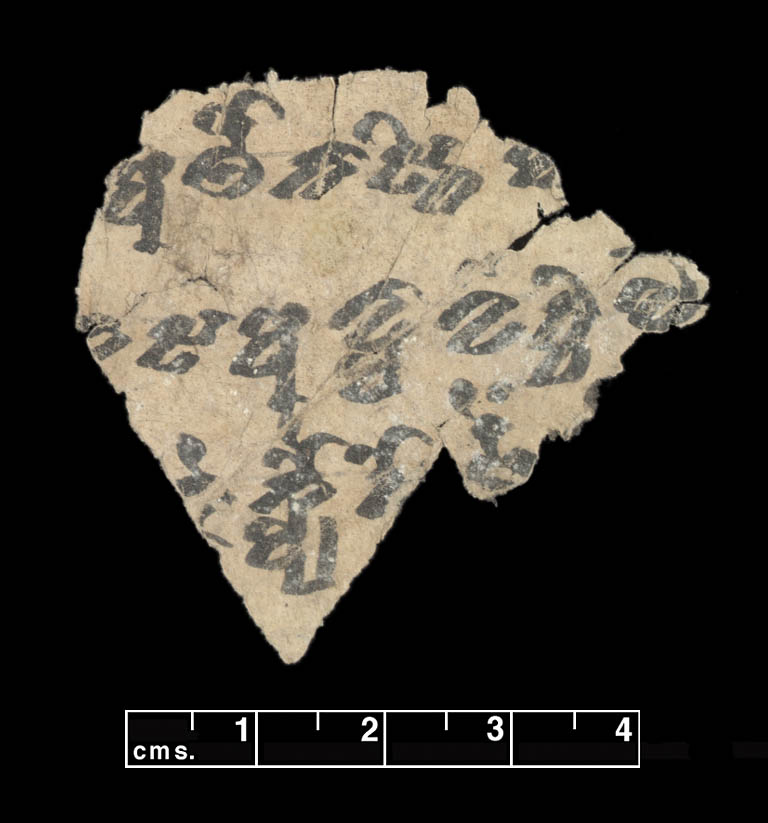IOL Toch 569
| Known as: | IOL Toch 569; D 210 |
|---|---|
| Cite this page as: | Michaël Peyrot. "IOL Toch 569". In A Comprehensive Edition of Tocharian Manuscripts (CEToM). Created and maintained by Melanie Malzahn, Martin Braun, Hannes A. Fellner, and Bernhard Koller. https://cetom.univie.ac.at/?m-ioltoch569 (accessed 06 Jul. 2025). |
Edition | |
| Editor: | Michaël Peyrot |
Provenience | |
| Main find spot: | Unknown |
| Collection: | British Library (London) |
Language and Script | |
| Language: | Skt.; TB |
| Linguistic stage: | classical |
| Script: | classical |
Text contents | |
| Title of the work: | Udānavarga |
| Passage: | 31.60c-32.4c |
| Text genre: | Literary |
| Text subgenre: | Doctrine |
| Verse/Prose: | prose |
Object | |
| Material: | ink on paper |
| Form: | Poṭhī |
| Size (h × w): | 4.6 × 5.0 cm |
| Number of lines: | 4 |
Images
Images from idp.bl.uk by courtesy of the International Dunhuang Project and the British Library.
Transliteration
| a1 | /// ·t· ·r· /// |
|---|---|
| a2 | /// [s]u ra kṣi t· [p]r· /// |
| a3 | /// m· pta ḥ pa lsko ṣṣe kr· /// |
| a4 | /// [y]· hi nā nya po /// |
| b1 | /// a rtho nā sti [j]· /// |
| b2 | /// [na] sa a wlā wä cci o /// |
| b3 | /// ke klyau ṣo rmeṃ – /// |
Transcription
| a1 | /// ·t· ·r· /// |
|---|---|
| a2 | n1 /// surakṣit(e) pr(ajā) /// |
| a3 | n2 /// (sa)m(ā)ptaḥ pälskoṣṣe kr(aupe) /// |
| a4 | n3 /// (ātmabharā)y(a) hi nānyapo(ṣiṇe) /// |
| b1 | n4 /// artho nāsti j(anasya) /// |
| b2 | n5 /// (rekau)nasa awlāwäcci o(nolmi) /// |
| b3 | n6 /// keklyauṣormeṃ – /// |
Translation
| a1 | ... |
|---|---|
| a2 | [SKT]: if (the mind) is well protected, [some] people |
| a3 | [SKT]: the cittavarga is finished [TB]: the [verse] collection on the mind (is finished) |
| a4 | [SKT]: who is self supporting and not dependent on others |
| b1 | [SKT]: for him there is no reason for (mutterings) towards people |
| b2 | [TB]: uncontrolled beings (strike) with words |
| b3 | [TB]: hearing (a harsh word uttered) |
Commentary
Parallel texts
| m-tht2375c; Bernhard 1965: 430-432; Hahn 2007: 133 |
Philological commentary
| n1 | Uv.31.60c citte tu surakṣite prajā |
|---|---|
| n2 | Uv.31.60end cittavargaḥ, here cittavargaḥ samāptaḥ |
| n3 | Uv.32.1b hy ātmabharāya hi nānyapoṣiṇe; lines Uv. 32.1b and 2b are identical, but line 1b fits better to the interval between a2 and a3. |
| n4 | Uv.32.3d hy artho nāsti janasya lāpanam (see also Bechert and Waldschmidt 1973 IV: 58a; Strong 1902: 27) |
| n5 | Uv.32.4a tudanti vācābhir asaṃyatā janāḥ |
| n6 | Uv.32.4c śrutvā tu vācāṃ paruṣām udīritām |
References
Online access
Edition
Peyrot 2007: №569; Peyrot 2008a: 115
Bibliography
Bechert, Heinz, and Ernst Waldschmidt. 1973. Sanskrit-Wörterbuch der buddhistischen Texte aus den Turfan-Funden. Göttingen: Vandenhoeck & Ruprecht.
Bernhard, Franz. 1965. Udānavarga. Band I, Einleitung, Beschreibung der Handschriften, Textausgabe, Bibliographie. Sanskrittexte aus den Turfanfunden 10. Göttingen: Vandenhoeck und Ruprecht.
Hahn, Michael. 2007. Vom rechten Leben, Buddhistische Lehren aus Indien und Tibet, Aus dem Sanskrit und aus dem Tibetischen übersetzt und herausgegeben. Frankfurt am Main/Leipzig: Verlag der Weltreligionen (im Insel Verlag).
“The International Dunhuang Project: The Silk Road Online.” n.d. http://idp.bl.uk.
Peyrot, Michaël. 2007. “An edition of the Tocharian fragments IOL Toch 1 – IOL Toch 822 in the India Office Library.” International Dunhuang Project. 2007. http://idp.bl.uk/database/oo_cat.a4d?shortref=Peyrot_2007.
Peyrot, Michaël. 2008a. “More Sanskrit – Tocharian B bilingual Udānavarga fragments.” Indogermanische Forschungen 113: 83–125.
Strong, Dawsonne M. 1902. The Udāna, or solemn utterances of the Buddha, translated from the Pali. London: Luzac.




